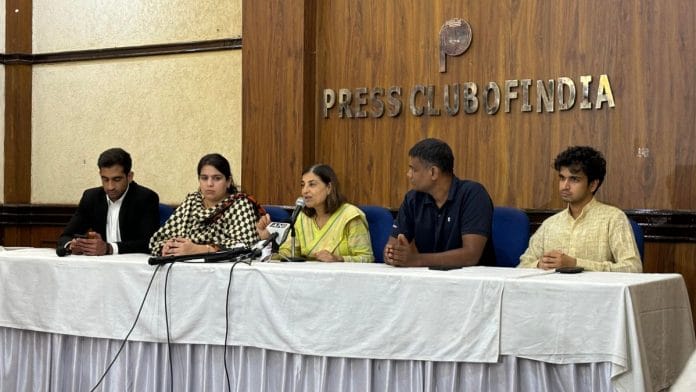New Delhi: Hours after the Supreme Court modified its stray dogs order, animal activists Friday said they hoped that when municipal corporations act on the court’s directions to designate feeding points, they do so in consultation with caregivers in the area.
“Feeders should also understand that they can’t feed dogs in public areas. This provision is already in the Animal Birth Control (ABC) Rules. It’s nothing new,” said Dr Asher R. Jesudoss, member of the Delhi Animal Welfare Board, at a press conference in the capital.
Jesudoss added that the Municipal Corporation of Delhi (MCD) should show “the same level of excitement” in building dedicated feeding spaces as they showed for catching stray dogs and putting them in shelters.
The Supreme Court Friday modified its 11 August ruling and ordered that Delhi-NCR stray dogs must be dropped back in their original territories after sterilisation and vaccination, barring dogs with rabies or exhibiting aggressive behaviour. The earlier ruling, which said that all Delhi-NCR strays must be rounded up and put in shelters, elicited a wave of uproar, and a number of pleas seeking a stay, following which Chief Justice of India B. R. Gavai referred the matter to a larger three-judge bench, which passed the Friday order.
On Friday, animal activists said that while the SC’s directions on dedicated feeding spots is a welcome move, they had some concerns.
Ashima Sharma, a member of India Unites for Animal Rights, who organised the press conference, said, “There should be feeding points. Absolutely. But to say don’t feed them on the streets is like saying ‘stay in your house but you can’t eat food’.”
“Dogs are territorial animals and eat in their own territory,” Sharma added, echoing Jesudoss as she said feeding points should be made only in consultation with local caregivers.
Gaurav Dar, chairman of Vasundhara Animal Welfare Trust and consultant at People for Animals, was one among the attendees. ThePrint spoke to him on the Supreme Court’s directions of giving people an option to adopt stray dogs by applying to the Municipal Corporation. He stated it was a very necessary step to encourage the adoption of these dogs.
“Earlier, people were not used to adopting Indies a lot. However, a change is happening gradually where more people are adopting them. This change is happening because of awareness and counselling programmes,” he added.
Dar added that while people have been more inclined towards buying foreign breeds for “social status”, these days, foreign breeds like Rottweiler and Pitbull make up majority of pets that are abandoned.
Others who spoke at the press conference included Ambika Shukla, an animal rights activist and a trustee of People for Animals, Divya Puri, an animal rescuer and co-founder of Karan Puri Foundation, and advocate Divyam Khera.
Puri said the public healthcare system should create more awareness about rabies and how to prevent the fatal disease. “Everything is not to be blamed on the animal. We have to work for humans also. So, people who work should also ensure that vaccines are available and the public are educated about rabies, and we have to do it at a grassroots level.”
Shukla said “animal welfare and human welfare are not in competition”, rather they are connected. “When we protect animals, we protect ourselves. Jeev hai to Jeevan hai (With living beings, life exists),” she added.
Ojas Jaiswal is an alum of ThePrint School of Journalism, currently interning with ThePrint.
(Edited by Gitanjali Das)






